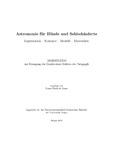Citation link:
https://nbn-resolving.org/urn:nbn:de:hbz:467-9767Files in This Item:
| File | Description | Size | Format | |
|---|---|---|---|---|
| Dissertation_Simon_Friedrich_Kraus.pdf | 54.64 MB | Adobe PDF |  View/Open |
| Dokument Type: | Doctoral Thesis | metadata.dc.title: | Astronomie für Blinde und Sehbehinderte : Legitimation – Konzepte – Modelle – Materialien | Other Titles: | Astronomy for blind and visually impaired | Authors: | Kraus, Simon Friedrich | Institute: | Fakultät IV - Naturwissenschaftlich-Technische Fakultät | Free keywords: | Astronomiedidaktik, astronomy, blind, visually impaired, physics education | Dewey Decimal Classification: | 520 Astronomie, Kartographie | GHBS-Clases: | IKP VAN VHE VHH |
Issue Date: | 2015 | Publish Date: | 2016 | Abstract: | In der vorliegenden Arbeit soll der Frage nach den Möglichkeiten eines Astronomieunterrichts für Blinde und Sehbehinderte nachgegangen werden. Es wird zunächst gezeigt, dass astronomischen Inhalten aus Sicht der Gesellschaft eine immense Bedeutung zukommt und sie große Potentiale für die Schule bieten. Daher sollten auch für Blinde und Sehbehinderte entsprechende Angebote entwickelt werden. Die Identifikation besonders bedeutsamer Inhalte geschieht mit Hilfe einer Lehrplananalyse. Unter Verwendung der Methode der strukturierten Inhaltsanalyse wird hierbei die Schnittmenge von sieben Lehrplänen ermittelt. Diese Auswahl bildet die Grundlage für die Entwicklung entsprechender Modelle. Um über den Tastsinn hinaus weitere Sinne anzusprechen, werden die speziellen Eigenschaften verschiedener Wahrnehmungskanäle zusammengestellt. Damit werden ihre jeweiligen Möglichkeiten und Grenzen ausgelotet. Die Informationsvermittlung über verschiedene Sinne soll einerseits zu einer leichteren Assoziation von Phänomenen und Modellen beitragen und andererseits die Behaltensleistung fördern. Die gewonnen Ergebnisse der Lehrplananalyse sowie die Eigenarten der menschlichen Sinne werden – unter Einbeziehung von Erkenntnissen der allgemeinen Didaktik, der Fachdidaktik sowie der Blinden- und Sehbehindertendidaktik – in der Entwicklung astronomischer Modelle zusammengeführt. Dabei werden beispielhaft verschiedene Konzepte zur Nutzung unterschiedlicher Sinne wie des Tastsinns, des Wärmeempfindens und des Gehörs verwirklicht. Die Modelle werden eingebettet in Begleitmaterial in Form von Texten und tastbaren Grafiken. This dissertation will discuss the question of the opportunities to make astronomical education accessible for blind and visually impaired people. It will be shown that astronomical contents are from enormous significance for the society. They hold great potentials for educational purposes too. Therefor there should be corresponding offers for blind and visually impaired people. The identification of particularly significant contents will be done by analysing the curriculum. The intersection of 7 curricula will be determined. The obtained sample of contents forms the foundation for the development of astronomical models. Specific properties of different senses will be composed to find ways of impartation reaching beyond the tactile sense. The use of different senses should improve the connotation of phenomena and models. With regard of teaching methodology and didactics for blind and visually impaired, the obtained results will be united by the development of astronomical models. It will be exemplarily shown, how to make use of the tactile and aural sense and even the sensation of heat. All models are accompanied by further material in the form of explanations and tactile graphics. |
URN: | urn:nbn:de:hbz:467-9767 | URI: | https://dspace.ub.uni-siegen.de/handle/ubsi/976 | License: | https://dspace.ub.uni-siegen.de/static/license.txt |
| Appears in Collections: | Hochschulschriften |
This item is protected by original copyright |
Page view(s)
825
checked on Dec 26, 2024
Download(s)
1,010
checked on Dec 26, 2024
Google ScholarTM
Check
Items in DSpace are protected by copyright, with all rights reserved, unless otherwise indicated.

